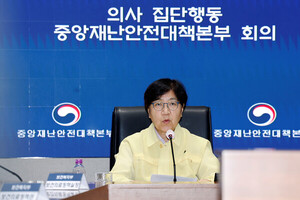‘RSV antibody Beyfortus seen as key to stabilizing healthcare system’ < Pharma < Article

The “I” in the National Immunization Program (NIP) stands for “Immunization.” The criteria for evaluating NIP inclusion are based on an immunological perspective. After reviewing the actual efficacy and intended use of Beyfortus (across various countries), it was concluded that it differs little from vaccines, leading to its final inclusion in the NIP.
The RSV antibody injection Beyfortus (nirsevimab) was introduced in Korea this February, making it available for all newborns and infants during their first RSV epidemic season. This enables a more proactive response to RSV prevention in infants and young children.
Respiratory Syncytial Virus (RSV) is a major seasonal infectious disease that can lead to severe lower respiratory infections, such as bronchiolitis and pneumonia, causing hospital bed shortages each winter.
In this regard, Beyfortus has emerged as a preventive option, rapidly changing the clinical landscape. Following its approval by the European Medicines Agency (EMA) in 2022, Beyfortus has been incorporated into national immunization programs in several countries, presenting a new form of preventive strategy: the “antibody preventive injection.”
However, while Beyfortus is similar to vaccines in terms of preventive efficacy, its approval in Korea as a “preventive antibody injection” rather than a vaccine has created obstacles to NIP inclusion. To address this, Korea Biomedical Review met with Cesar Mascareñas, Global Medical Head for the International Region at Sanofi, to discuss Beyfortus’ preventive value and its public health benefits if adopted into the NIP.

Question: What is the global adoption status and actual scale of administration for Beyfortus?
Answer: Beyfortus is currently adopted in over 50 countries worldwide and has been administered in most regions, including North America, Europe, South America, the Middle East, and Asia. Globally, it is estimated that approximately 6 to 7 million infants and young children have received the injection.
Beyfortus is a monoclonal antibody-based RSV preventive antibody injection. Due to regulatory and institutional contexts, countries operate it as an “immunization” program rather than a “vaccine” program. In other words, this antibody program for infants and young children is currently administered globally under the concept of “immunization.”
Q: Does the RCT clinical trial that formed the basis for Beyfortus’ approval show the same efficacy in actual clinical settings? Specifically, how much reduction in RSV-related hospitalizations is being achieved through Beyfortus?
A: According to Beyfortus’ clinical study results, the efficacy in preventing RSV infection in the treatment group was high at 83 percent. This means 83 percent of children who received the vaccine were protected from RSV infection. However, when applying this beyond the clinical trial setting to large populations, measuring actual reductions in RSV infections is challenging. Since infection symptoms range from mild to severe, the primary specific indicator for effectiveness is typically the rate of RSV-related hospitalizations.
While there are slight variations depending on the reporting country, Beyfortus has been shown to reduce the hospitalization rate due to RSV infection by 75–85 percent. It has also been confirmed to reduce the incidence of intensive care unit (ICU) admissions by 85 percent.
Significant results were also observed in mortality rates. Data from Chile showed 13 RSV-related deaths among children under one year old in 2023, but this number dropped to zero in 2024 following a large-scale vaccination program. This confirms that in real-world settings, Beyfortus can reduce RSV-related hospitalization rates, ICU admission rates, and mortality rates.
Q: Is there specific data proving a difference in the effect of reducing RSV-related infant hospitalizations between countries where Beyfortus is introduced into the NIP and countries like Korea, where it is administered at personal expense?
A: There is currently no such data available. However, an estimate can be made using the concept of “Number Needed to Vaccinate (NNV).” NNV is an indicator showing how many doses of a specific product must be administered to prevent one target case.
For Beyfortus, administering it to approximately 33 infants can prevent one RSV-related hospitalization. Multiplying this by the number of newborns born in a country in a year allows estimation of how many RSV-related hospitalizations could be prevented. From a pediatrician’s perspective, this level of effectiveness means that after administering Beyfortus to 33 infants, one could go home that night feeling satisfied, thinking, “I prevented one hospitalization.”
Q: In Korea, Beyfortus faces difficulties in being introduced into the National Immunization Program (NIP) because it was approved as a preventive antibody injection. Have other countries faced similar difficulties?
A: This discussion has occurred in nearly every country. Beyfortus is a new product and the first instance of using a monoclonal antibody as a vaccine, so it was perceived as an unfamiliar concept in most countries. Initially, there were differing opinions, and the discussion persisted. However, ultimately, several countries decided to include Beyfortus in their NIP.
Q: What is the public health significance of including Beyfortus in the NIP? What long-term cost-effectiveness benefits can the government expect?
A: RSV is a seasonal disease, showing a pattern in Korea of gradually increasing from October to March before subsiding. Like other seasonal diseases, including influenza, it causes a short-term surge of patients flooding hospitals. This inevitably leads to a decline in the quality of medical services compared to normal times.
Doctors and nurses are overwhelmed by excessive workloads, and other critical medical services are also delayed. Hospitals must also provide continuous monitoring for procedures such as surgeries, cancer treatments, and the management of patients with chronic diseases. In this situation, if medical personnel and resources become concentrated in one area due to an increase in RSV emergency patients, it becomes difficult to provide other services properly.
Reducing hospitalization rates goes beyond simply decreasing admissions. Fewer hospitalizations allow for a more even distribution of medical staff and resources. This helps maintain smooth healthcare services for the entire community. It holds significant social value as it provides doctors and nurses with the necessary breathing room to adequately care for patients with other conditions or those requiring ongoing management.
However, these benefits are often not sufficiently recognized by society. To provide quality healthcare services, healthcare professionals require adequate time, space, and the freedom to focus. The Beyfortus public vaccination program creates this leeway in personnel and resources for such healthcare services, contributing to the long-term stabilization of the healthcare system and cost savings for society as a whole.
Q: What would you advise on the institutional and clinical support measures needed for healthcare providers to properly prescribe Beyfortus in clinical settings?
A: Above all, the role of academic societies is crucial. Societies like the Korean Pediatric Society, composed of medical experts, can play a vital role in widely disseminating medical information about RSV, including its nature, associated diseases, epidemiological characteristics, and prevention methods. Based on this scientific evidence, they can propose prevention guidelines.
link







